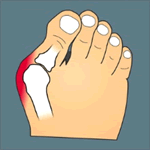 Hallux valgus, or more commonly known as bunions, occurs when the joint of the big toe turns into a large bump and the big toe starts to turn into the smaller toes. Accordingly, the foot condition occurs in nearly one in three adults and can occur due to family genetics and through improper footwear. Bunion treatment typically begins with non-surgical treatments such as wearing a shoe with a wider toe box or wearing pads over the bump to cushion the area. When nonsurgical treatments do not work, surgery is considered as a last resort. With the surgery come risks such as scarring, bunion recurrence, arthritis, and other ailments. Recovery usually takes up to 12 weeks and a protective sandal or boot is necessary for proper healing.
Hallux valgus, or more commonly known as bunions, occurs when the joint of the big toe turns into a large bump and the big toe starts to turn into the smaller toes. Accordingly, the foot condition occurs in nearly one in three adults and can occur due to family genetics and through improper footwear. Bunion treatment typically begins with non-surgical treatments such as wearing a shoe with a wider toe box or wearing pads over the bump to cushion the area. When nonsurgical treatments do not work, surgery is considered as a last resort. With the surgery come risks such as scarring, bunion recurrence, arthritis, and other ailments. Recovery usually takes up to 12 weeks and a protective sandal or boot is necessary for proper healing.
The pain and discomfort caused by bunions can put a halt to everyday activities. If you have any concerns contact podiatrist Dr. Joshua David Scoll of Pennsylvania. Our doctor will treat your foot and ankle needs.
What is a Bunion?
A bunion is formed of swollen tissue or an enlargement of boney growth, usually located at the base joint of the toe that connects to the foot. The swelling occurs by the bones in the big toe shifting inward, which impacts the other toes of the foot. This causes the area around the base of the big toe to become inflamed and painful.
Why do Bunions Form?
• Genetics – susceptibility to bunions are often hereditary
• Stress on the feet – poorly fitted and uncomfortable footwear that places stress on feet, such as heels, can cause bunions to form
How are Bunions Diagnosed?
Doctors often perform two tests – blood tests and x-rays – when trying to diagnose bunions, especially in the early stages of development. Blood tests help determine if the foot pain is being caused by something else, such as arthritis, while x-rays provide a clear picture of your bone structure to your doctor.
How are Bunions Treated?
• Refrain from wearing heels or similar shoes that cause discomfort
• Select wider shoes that can provide more comfort and reduce pain
• Anti-inflammatory and pain management drugs
• Orthotics or foot inserts
• Surgery
If you have any concerns please feel free to contact our offices located in Philadelphia and Bensalem, PA. We offer the newest diagnostic tools and technology to treat your foot and ankle needs.
